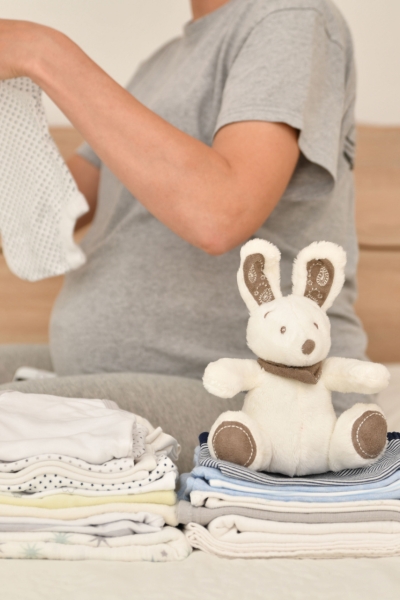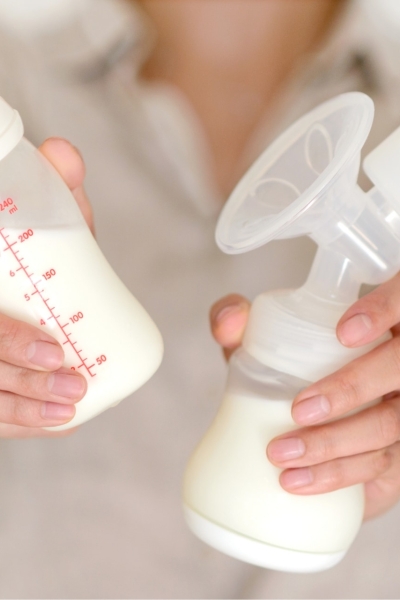Parent's corner

Sleeping like a baby during pregnancy
Share
My sleeping position

The ideal sleeping position is very often one of the first advice given in medical consultation to help pregnant women to improve their sleep.
Sleeping on your left side is often recommended to promote good blood circulation, with a pregnancy sleeping pillow placed under your belly and between your legs.
A pregnancy sleeping pillow is a real plus and is ideal especially for women who used to fall asleep on their stomachs. When it is placed under the abdomen and between the legs, it helps support the weight of the belly and relieve pressure in various areas of tension of the body.
For the sake of comfort, it is generally advisable to choose a pregnancy pillow of at least 1.70 m.
Keep in mind that the key is to find the sleeping position that is most comfortable for you.
Sport, my natural relaxant and stress reliever

By soliciting the body, gentle and regular activity such as walking, prenatal yoga or swimming, induces a feeling of good fatigue that helps you falling asleep.
More specifically, prenatal yoga has a natural relaxing and anti-stress effect and can also prevent other pregnancy ailments such as back pain, excessive weight gain and night cramps.
My diet, my first medicine for a restful sleep

You should prefer to drink highly mineralized water, especially rich in calcium, and distribute your fluid intake as much as possible during the day and as little as possible close to bedtime to reduce the urge to urinate at night. Water intake helps you fight fatigue in addition to reducing constipation.
Ensure a good supply of protein at breakfast and at lunch (eggs, quinoa, lentils, dairy products, etc...) to provide the body with tryptophan. Tryptophan is an essential amino acid that is naturally involved in our body in the synthesis of melatonin, known to be the “sleep hormone”.
Give pride of place to fruits and vegetables (preferably when they are cooked) which are rich in minerals and vitamins, to plain oleaginous fruits (almonds, cashews, pecan nuts, etc…) which are rich in magnesium and to whole meal or semi-whole meal starchy foods (bread, pasta, and rice) that are richer in fibres, minerals and vitamins.
You may consider doing a blood test with your doctor to check for any deficiencies in iron, vitamin B9 (folic acid), magnesium or calcium which are key nutrients during pregnancy and can influence your sleep.
Consult your doctor or dietitian for more nutritional advice tailored to your health situation.
SOS acid reflux
In most cases doctors, midwives, dietitians and other health professionals will give you the following advice:
- Split your food intake throughout the day,
- During meals, take your time to eat and chew your food well,
- Go for light cooking: poached or roasted, in foil, boiled or steamed,
- Drink small amounts of water between your meals,
- At dinner, prefer lighter meals and eat at least 3 hours before bedtime,
- Elevate the head of your bed with a pillow and choose loose, comfortable clothes that do not compress your stomach.
If nothing helps, antacid treatment may be suggested on medical advice.
I relax

I look for calm and for a not too stimulating activity before bedtime (reading, listening to relaxing music, coloring art therapy, ...).
Self-hypnosis is a proven technique which, thanks to positive visualizations on the feeling of comfort during sleep (e.g. imagining that one's thoughts are as smooth as a mountain lake), allows to free oneself from fears and worries related to pregnancy and the new life of future parents.
It has also been demonstrated that self-hypnosis helps reduce medication and painkillers and promote sleep.
Self-hypnosis is an invitation to immerse oneself in a state of relaxation and modified consciousness to better manage anxiety-provoking situations.
The father-to-be/co-parent can very well take part in this with you.
My bedroom
For a restful sleep, your bedroom should be cool (18°C), clean, tidy, well-ventilated (at least 10 minutes a day) and be protected from any source of too intense light.
Similarly, blue light from screens should be avoided 1 to 2 hours before bedtime because it stimulates retinal receptors which send a "day signal" to your biological clock, delaying sleep by reducing the secretion of melatonin, our natural sleep hormone.
Catnap, my best sleep ally
One third of sleep-deprived people take a catnap during the week.
A catnap during the day extends your sleep time. The catnap should ideally take place in the early afternoon, out of bed and it should be short (about 30 minutes) so as not to interfere with your night's sleep.
In brief, sleep disorders during pregnancy are very common and quite normal and these few tips can make a difference in order to preserve your sleep.
Important notice
This article is not a substitute for a medical consultation or the advice from a healthcare professional.
References
- Groupe de travail partenaire des JPRS (2016), Le sommeil lorsque l’on est enceinte [Brochure]. Création JUUD l’agence, https://secure.key4events.com/key4register/images/client/994/Grossesse_et_sommeil_/VIS_A_VIS%20(3).pdf
- Institut National du Sommeil et de la Vigilance. (2019), Sommeil et Nutrition [Brochure]. Publisher name. https://institut-sommeil-vigilance.org/wp-content/uploads/2019/02/DPJourneeDuSommeil_25-03-15.pdf
Caron, A. (2019). Le sommeil chez la femme enceinte [Thèse]. https://hal-normandie-univ.archives-ouvertes.fr/dumas-02268607/ - De la grossesse à l’accouchement, tous les bienfaits de l’auto-hypnose (2017, 9 juin), Enfant.com, https://www.en-fant.com/grossesse/sante-bien-etre/grossesse-laccouchement-tous-bienfaits-lauto-hypnose-4662
- Conseils alimentaires pour bien dormir (2019, octobre), pileje.ch, https://www.pileje.ch/fr-ch/revue-sante/conseils-ali-mentaires-bien-dormir
- Femmes et insomnie : l’hypnose à la rescousse ! (2005, 4 décembre), mamanpourlavie.com, https://www.mamanpourla-vie.com/sante/alternatives-naturelles/hypnotherapie/53-femmes-et-insomnie-l-hypnose-la-rescousse.html









